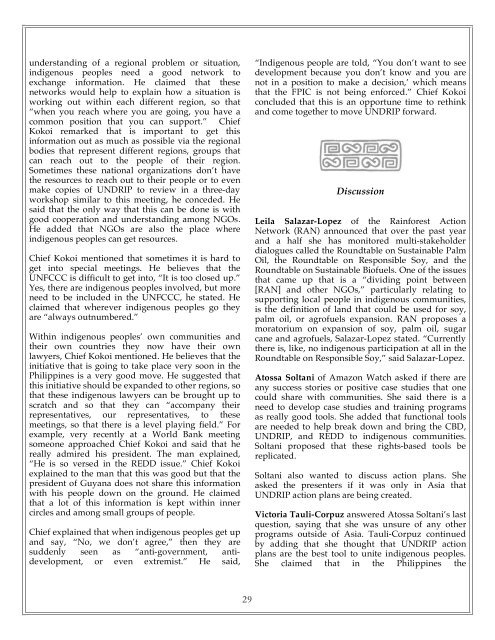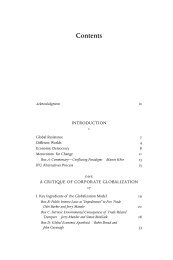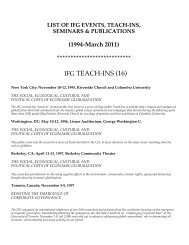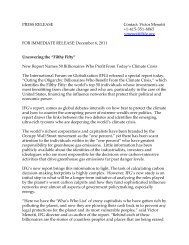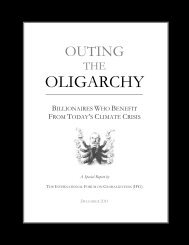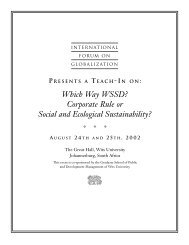UNDRIP Report - English FINAL - International Forum on Globalization
UNDRIP Report - English FINAL - International Forum on Globalization
UNDRIP Report - English FINAL - International Forum on Globalization
You also want an ePaper? Increase the reach of your titles
YUMPU automatically turns print PDFs into web optimized ePapers that Google loves.
understanding of a regi<strong>on</strong>al problem or situati<strong>on</strong>,<br />
indigenous peoples need a good network to<br />
exchange informati<strong>on</strong>. He claimed that these<br />
networks would help to explain how a situati<strong>on</strong> is<br />
working out within each different regi<strong>on</strong>, so that<br />
“when you reach where you are going, you have a<br />
comm<strong>on</strong> positi<strong>on</strong> that you can support.” Chief<br />
Kokoi remarked that is important to get this<br />
informati<strong>on</strong> out as much as possible via the regi<strong>on</strong>al<br />
bodies that represent different regi<strong>on</strong>s, groups that<br />
can reach out to the people of their regi<strong>on</strong>.<br />
Sometimes these nati<strong>on</strong>al organizati<strong>on</strong>s d<strong>on</strong>’t have<br />
the resources to reach out to their people or to even<br />
make copies of <str<strong>on</strong>g>UNDRIP</str<strong>on</strong>g> to review in a three-day<br />
workshop similar to this meeting, he c<strong>on</strong>ceded. He<br />
said that the <strong>on</strong>ly way that this can be d<strong>on</strong>e is with<br />
good cooperati<strong>on</strong> and understanding am<strong>on</strong>g NGOs.<br />
He added that NGOs are also the place where<br />
indigenous peoples can get resources.<br />
Chief Kokoi menti<strong>on</strong>ed that sometimes it is hard to<br />
get into special meetings. He believes that the<br />
UNFCCC is difficult to get into, “It is too closed up.”<br />
Yes, there are indigenous peoples involved, but more<br />
need to be included in the UNFCCC, he stated. He<br />
claimed that wherever indigenous peoples go they<br />
are “always outnumbered.”<br />
Within indigenous peoples’ own communities and<br />
their own countries they now have their own<br />
lawyers, Chief Kokoi menti<strong>on</strong>ed. He believes that the<br />
initiative that is going to take place very so<strong>on</strong> in the<br />
Philippines is a very good move. He suggested that<br />
this initiative should be expanded to other regi<strong>on</strong>s, so<br />
that these indigenous lawyers can be brought up to<br />
scratch and so that they can “accompany their<br />
representatives, our representatives, to these<br />
meetings, so that there is a level playing field.” For<br />
example, very recently at a World Bank meeting<br />
some<strong>on</strong>e approached Chief Kokoi and said that he<br />
really admired his president. The man explained,<br />
“He is so versed in the REDD issue.” Chief Kokoi<br />
explained to the man that this was good but that the<br />
president of Guyana does not share this informati<strong>on</strong><br />
with his people down <strong>on</strong> the ground. He claimed<br />
that a lot of this informati<strong>on</strong> is kept within inner<br />
circles and am<strong>on</strong>g small groups of people.<br />
Chief explained that when indigenous peoples get up<br />
and say, “No, we d<strong>on</strong>’t agree,” then they are<br />
suddenly seen as “anti-government, antidevelopment,<br />
or even extremist.” He said,<br />
“Indigenous people are told, “You d<strong>on</strong>’t want to see<br />
development because you d<strong>on</strong>’t know and you are<br />
not in a positi<strong>on</strong> to make a decisi<strong>on</strong>,’ which means<br />
that the FPIC is not being enforced.” Chief Kokoi<br />
c<strong>on</strong>cluded that this is an opportune time to rethink<br />
and come together to move <str<strong>on</strong>g>UNDRIP</str<strong>on</strong>g> forward.<br />
Discussi<strong>on</strong><br />
Leila Salazar-Lopez of the Rainforest Acti<strong>on</strong><br />
Network (RAN) announced that over the past year<br />
and a half she has m<strong>on</strong>itored multi-stakeholder<br />
dialogues called the Roundtable <strong>on</strong> Sustainable Palm<br />
Oil, the Roundtable <strong>on</strong> Resp<strong>on</strong>sible Soy, and the<br />
Roundtable <strong>on</strong> Sustainable Biofuels. One of the issues<br />
that came up that is a “dividing point between<br />
[RAN] and other NGOs,” particularly relating to<br />
supporting local people in indigenous communities,<br />
is the definiti<strong>on</strong> of land that could be used for soy,<br />
palm oil, or agrofuels expansi<strong>on</strong>. RAN proposes a<br />
moratorium <strong>on</strong> expansi<strong>on</strong> of soy, palm oil, sugar<br />
cane and agrofuels, Salazar-Lopez stated. “Currently<br />
there is, like, no indigenous participati<strong>on</strong> at all in the<br />
Roundtable <strong>on</strong> Resp<strong>on</strong>sible Soy,” said Salazar-Lopez.<br />
Atossa Soltani of Amaz<strong>on</strong> Watch asked if there are<br />
any success stories or positive case studies that <strong>on</strong>e<br />
could share with communities. She said there is a<br />
need to develop case studies and training programs<br />
as really good tools. She added that functi<strong>on</strong>al tools<br />
are needed to help break down and bring the CBD,<br />
<str<strong>on</strong>g>UNDRIP</str<strong>on</strong>g>, and REDD to indigenous communities.<br />
Soltani proposed that these rights-based tools be<br />
replicated.<br />
Soltani also wanted to discuss acti<strong>on</strong> plans. She<br />
asked the presenters if it was <strong>on</strong>ly in Asia that<br />
<str<strong>on</strong>g>UNDRIP</str<strong>on</strong>g> acti<strong>on</strong> plans are being created.<br />
Victoria Tauli-Corpuz answered Atossa Soltani’s last<br />
questi<strong>on</strong>, saying that she was unsure of any other<br />
programs outside of Asia. Tauli-Corpuz c<strong>on</strong>tinued<br />
by adding that she thought that <str<strong>on</strong>g>UNDRIP</str<strong>on</strong>g> acti<strong>on</strong><br />
plans are the best tool to unite indigenous peoples.<br />
She claimed that in the Philippines the<br />
29


